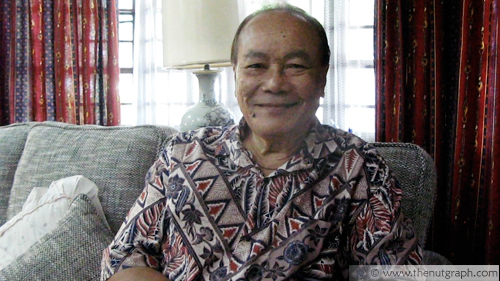
BEFORE Senator Tunku Abdul Aziz Ibrahim became a politician, he was far better known as a Malaysian champion of transparency, integrity and good governance. Indeed, it was no coincidence that Tunku Aziz, together with like-minded individuals, founded Transparency International Malaysia (TI-Malaysia) in 1998. He was TI-Malaysia president until December 2004.
Even after setting up TI-Malaysia, the former Bank Negara advisor actively promoted ethics and good governance at both the regional and international level. This included work within the World Bank and the United Nations. It was in his capacity as special advisor to the UN secretary-general, a post he was appointed to in 2006, that he set up the UN Ethics Office.
He returned from New York on completion of this work in 2007, and in 2008 joined DAP, a party he had been monitoring for the past 20 years “without their knowledge”. He is currently DAP national vice-chairperson, and was appointed as the first DAP senator in July 2009.
In this 1 June 2010 interview with The Nut Graph at his Kuala Lumpur home, Tunku Aziz talks about his royal Hindu ancestry and what it was like living in the days before and after independence.
TNG: Where were you born, and what were your earliest childhood memories?
Tunku Aziz: I was born in Alor Star in 1934. My father was an officer in the Kedah state police. My earliest memories were of the parades that were held frequently, accompanied by the Kedah state police band. I suppose that was how I have come to love military music and brass bands.
We were literally surrounded by police families when I was born. Those days in Kedah, there were two avenues for young men — the Kedah civil service and the Kedah state police. My father’s elder brother opted for the civil service, and my father became a police officer.
There was a lot of freedom to play with friends of all races. There was no homework in the lower classes, and no big school bag to lug around. My childhood memories are filled with going swimming in the river at Gurun and Kulim without telling my mother. Things like that. [But] my mother always knew if I had been swimming because my red eyes gave me away.
Can you trace your ancestry?
My family history goes back several hundred years. We can trace our origins from the days of the Hindu kingdom. My ancestors were Hindu before they became Muslim. I descended from the line of Sultan Abdullah, who had two sons, Sultan Ahmad Shah and Tunku Yaakob, also known as Tunku Embong. He, being the younger, became the Raja Muda. In short, that is my family tree.
As I have indicated, the present Kedah ruler can trace his lineage back to the first Hindu king of Kedah. It is the country’s oldest royal line. My mother was a dayang from Brunei whose elder sister married my father’s elder bother — two brothers marrying two sisters.
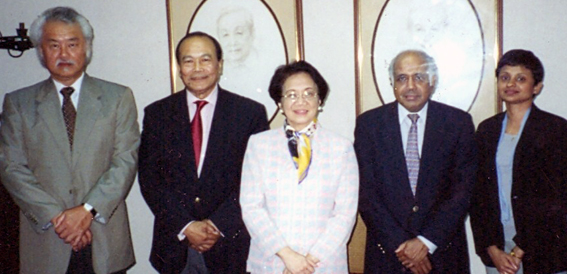
What are the childhood stories you remember the most?
Probably the most important advice that my father gave to me went something like this. That it is no use driving a big, expensive car if people in the coffee shops are going to say, as you drive by, “Look at that [person] driving a big car. He [or she] is on the take.”
That made a strong impression on me, because this is where self worth comes into the picture. And if you have no self respect to begin with, you have no respect for other people. This is why I have always tried to resist any temptation to take a bribe, knowing full well that I would never be able to live with myself.
[My father] was a stickler for rules. I remember as an 11-year-old, [I] had my own [football] team that played matches in kampongs some four or five miles away. He would always remind me to ensure that when I cycled home in the evening, my bicycle had a light. Followed by, “If you are caught riding without a lamp, don’t claim that you are the son of the OCPD.” He was then the Alor Star OCPD!
How do you connect with these stories as a Malaysian?
I come from the state of Kedah, which was an independent country before it became a protected state of the British empire. The people of Kedah ran their own affairs and there was a sense of confidence. Unlike [Malay Malaysians] in the other parts, except for Johor, who were virtually under British control and domination. I think when you have confidence in your ability to deal with people, then you don’t worry too much about the ethnicity of the other person.
Having grown up with Chinese [Malaysian] and Indian [Malaysian] friends in particular, it never occurred to me that they were to be treated differently. They were just my friends.
In Kedah, although it was a Malay state, there was no discrimination, although the Kedah civil service and the officer ranks of the Kedah state police were open only to educated boys from “good Malay” families. I remember when I was growing up, the state treasurer was a highly respected Chinese [Malaysian]. I grew up used to people of all races living and working together.
I have always believed that we are one people, the strength of our country is derived from our diversity. And I have always maintained long before (Prime Minister Datuk Seri) Najib (Razak) that tolerance was not good enough. Because it suggests our making small concessions that people are prepared to make, grudgingly. Acceptance of our cultural differences, on the other hand, that is really the key to a united Malaysian nation.
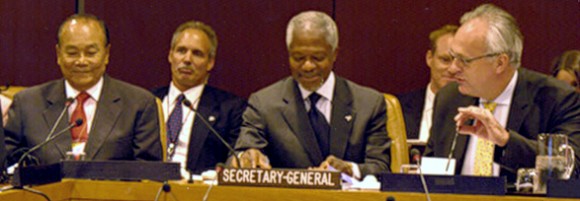
What does it mean to you coming from a royal Malay family, to have become a politician for all?
I feel a sense of responsibility as a Malaysian. That although I am not close to the throne, I carry the family title, and that means a great deal to me. Not to let the family down, and I supposem to protect the good name of the bigger family of Kedah.
I do my best and I am conscious of the fact there is a long history behind us of providing leadership. For a long time, I have been concerned with polarisation which is very much in evidence. I feel that unless we change the way we look at the issues of culture and race, Malaysia will continue to be plagued by all kinds of problems which will really [distract us] from developing the country to its fullest potential.
For that reason, I made up my mind, against my better judgement, to be in politics. I have no regrets. I thought it was all very well and good to stand on the sidelines and comment on the country’s state of affairs. But if I wanted to help make a difference to national unity and development, then I had to be prepared to stand up and be counted.
I have always been opposed to race-based politics because when you focus on your own race, then you are consciously or unconsciously setting yourself apart. The attitude you adopt is not one of inclusiveness but exclusiveness. So I looked for a party that met my hopes and aspirations and found the DAP fitted the bill.
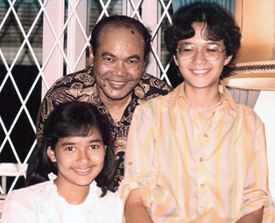
But you served, worked with, and admired many individuals who very much worked for the Malay race.
I can explain this. [Tun] Ismail Ali was my governor at the central bank. I was persuaded to join [Bank Negara] because I was inspired by his attitude towards his race. But more important, towards his nation as a whole.
He wanted the best for his race, but that wasn’t ketuanan Melayu or Malay supremacy. It was to make Malays self-sufficient, strive for the best, be less dependent on government support and subsidies. Most of all, he wanted something for all Malaysians, and that was equality of opportunity.
For example, when I was Bank Negara’s appointments committee head, both he and I felt that we should always go for the best talent. He recognised Malay [Malaysians] had not yet reached that level, but given the time and right opportunity, they would rise to the occasion.
I remember one year when I appointed 22 young economists who were Chinese [Malaysians]. One person said, “Tunku, do you know that there is this thing called the NEP?” I said I was well aware of that policy but if we wanted the best people to serve the bank then we would have to take the best candidates, irrespective of race, creed or colour.
And I asked him whether he understood Bank Negara’s principles and functions. He hesitated. I then told him its function was to give the best possible independent monetary and financial advice to the Malaysian government. What sort of advice would we be giving if we did not recruit the right people? If I had to scrape the bottom for advisors, then that advice would not amount to much.
What are your hopes for Malaysia?
After more than 50 years of Independence, we have come to the end of the line, as far as Umno-dominated policies are concerned. Those policies have been adopted and noted more for their divisiveness rather than cohesiveness, because most of these policies have elements of discrimination.
Obviously, we need a change and this can only come about if a new set of people with progressive ideas; people who are convinced the country’s future must be in the hands of all citizens. The policies which have failed us should be abandoned. I am hopeful that left to themselves, the people know what they need and what is good for them.
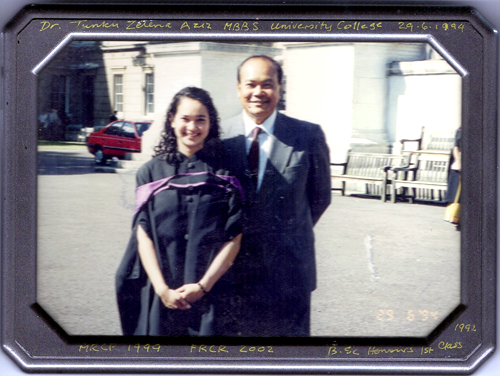
Our aspirations are similar in that we want a peaceful future, equal opportunities for our children and grandchildren. We must provide these opportunities. They need to feel that their country belongs to them, and that they can claim ownership without feeling marginalised, sidelined and discriminated against. Loyalty does not mean my country, right or wrong. It means I am prepared to work and make sacrifices because this is my country, my motherland. ![]()
The Nut Graph needs your support


Sean says
I agree with most of what Tunku Abdul Aziz says, in many of his articles. I don’t agree with “acceptance”. I had never heard “you must’ accept it!” before I came to Malaysia – it seems a common utterance whenever someone is carelessly abusive of another’s reasonable expectations. How far are we supposed to take acceptance? If we stay in a hotel and the room we are given has dirty sheets, must we accept it? If we get some maggoty fried chicken in our nasi ayam, must we accept it?
Tunku euphemistically asks us (OK, you – ‘us’ might be stretching a point) to accept ‘cultural differences’ in order to be a united nation. I have no doubt that in the case of dirty bed sheets and maggoty chicken that acceptance would unify our experience – to the obvious advantage of their respective purveyors. It would also entail a retreat in what we might consider reasonable expectation. How is that an aspirational goal? How are we (you) going to develop as a nation by first lowering your expectations?
There’s no ‘cultural’ correlation with maggoty chicken or dirty hotel bed sheets (at least not in my experience in Malaysia). On the other hand, there does seem to be a ubiquitous cross-‘cultural’ requirement for continuous, frequent, mostly minor but occasionally horrific, abuses of what might in other places and at other times be regarded as reasonable expectations between neighbours and compatriots. I think it’s grossly unfair – as well as an insult to what might reasonably called heritage – to blame these insults on culture (what might normally be regarded as culture, not any euphemistic usage of the word). There seems to me to be no end of casual insults and up to life-ruining rejections going on in Malaysia motivated by selfishness, petty-mindedness, greed, hubris, stupidity, empire-building, bigotry, short-term-quick-gain preferential trading schemes – but none of these things are normally attributes of ‘culture’. (I realise that scholars of contemporary culture would disagree with this, culture for them having a neutral meaning closer to ‘the habitual practises of a group’, but I suspect that to Abdul Enam Bungkusan and Jane Lim ‘culture’ has a positive meaning as the sort of thing that built the Pyramids, or ancient Rome, or Angkor Wat, or gave us writing or mathematics)
I think for Malaysia to move forward it very quickly needs to relocate culture as a matter of heritage and national pride, and prohibit its use (I believe it to be an ab-use to use heritage for personal or group leverage) in any other way. I don’t think Malaysians should ‘accept’ different cultures, I think they should relegate that consideration to its proper place – a quality to be celebrated on regular occasions, taught evenly and rationally in schools and discussed as an interesting and often enlightening topic.
Farouq Omaro says
I think I understand what the Tunku means with “acceptance”. It is not to be confused with accepting dirty linen in a hotel. Please don’t get confused, Mr Sean. I may have a friend who converted to another religion, but I still accept him. Now, how many people can accept that? I know of people crying for the blood of those who have converted. It is as easy as that. I might not be used to see a whole pig on a grill, but when I go to a friend’s house and see it, I accept it as a norm for him. And when we accommodate the customs of others, we are accepting them. For example, employers who allow longer lunch breaks on Fridays for their Muslim employees.
As for the title of the article “Hindus First, Before Becoming Muslims” – I think that this is nothing to shout about. In Sabah, there are Muslims who have Christian ancestry and they are proud of it. There are Christians who have pagan ancestry and they are proud of it. They are proud of their rich heritage, and I believe Malays in Malaya too should be proud of their heritage like the Tunku.
Reza says
Dear Farouq,
I am assuming your friend was a Muslim and then converted out of Islam. You must tell me how he pulled off this feat. I was under the impression that having “Islam” removed from your IC is next to impossible. I am asking because I may one day do the same. I would like the freedom and peace of mind to sit in a bar and sip whiskey without having to keep looking out for the bloody religious police.
How has he fared since? More importantly, how has he been treated by his other friends and family? Has he been ostracised and outcast? Please do tell!!!
Eng Wai Ong says
Reza,
[…]
“You must tell me how he pulled off this feat.”
Emmigration. In my very limited exposure I have witnessed two very bright people escaping this country in order to escape this religion.
Dr Syed Alwi says
This is nothing more than […] and syiok sendiri! Do you honestly think that the majority of Malaysia’s Malay-Muslims are going to put Islam aside ?
Not gonna happen my friend!
chng kooi seng says
One point not mentioned at all is that because of history (or due to it), Malay [Malaysians] have not developed a sense of nationalism, they have a sense of race/religion (because of [constitutional] definition). That’s why the policies and implementation are skewed to benefit them. Before 1957, there were nine sultanates and two straits settlements. There was no “Malay” country, no Malay “king”, no national anthem etc. The British formed all the states and called the area the Malay peninsula. All the boundaries of the states were drawn by the British. The only people who fought for independence were the Chinese, using the MCP. The Malays were the servants of the British and therefore fought on the side of the British. The Chinese fought the Japanese, and again the Malays did not help them. In fact the hidden history, sad to say, is that the Malays were collaborators of the Japs. This is a historical fact. Many of the sultans were party to this and because of his involvement one sultan left the country forever, never to return and was only brought back for his burial. This is the reason Sukarno condemned Malaysia for being [part of] a neo-colonialist plot. The Malays were given power on a silver plate. The Chinese were left out because of their involvement in the communist international. Not knowing how to govern a country, the inevitable happened. The past 50 years has seen the result of a country run by people who have no idea of “nationalism”. […] Malays leaders repeatedly proclaim that Malaysian nationalism is Malay nationalism and vice versa. Now we see the consequences of that policy. The country is deteriorating. The political pirates are having a field day. What do you expect? We are run by pirates. Malaysian nationalism is kicked out of the picture. The ruling party runs the country like a pirate outpost. I have seen the deterioration for the past 69 years. There is no hope until the whole scenario is changed for good.
Eng Wai Ong says
Very interesting piece, thanks.
Who is that Sultan ?
Sean says
@Farouq Omaro: ‘Sean’ is fine. I’m Dr Sean, but my doctorate is not in a relevant topic – to anything, really, so I rarely use the title. Let me know your preferred form of address if I’ve got it wrong.
I don’t think Tunku is asking Muslims to accept apostasy, is he? If he is, you understand him much better than I do! Maybe TNG’s creativity in selecting a string of words from Tunku’s interview is a problem? I also wouldn’t use ‘accept’ to describe maintaining a friendship against social pressure. That sounds like something much more respectable!
@Dr Syed Alwi: To whom are you asking the question, and for what purpose? I wouldn’t know how to answer it. I expect Malay Malaysians put Islam to one side every time they order a cup of tea or try on a pair of shoes, don’t they? I have to confess to not knowing any Malay Malaysians (or any Malaysian besides my wife and children) very well – but I would have thought most of them could answer a question like “Teh tarik or teh ais?” or “You want to try a larger size?” without saying “Islam!”. I am acquainted with some Malay Malaysians, and apart from the two fathers (on separate occasions!) in the playground who said “British? Why do you hate Muslims?”, the topic has simply never come up. Is that what you call “put aside”?
This is relevant to the topic – for meeting neighbours and colleagues, people taking part in similar activities, familiar faces in familiar places, there simply is no requirement for ‘Acceptance’. We are already united by location and by habit on those occasions when we find ourselves in each other’s company. Unless we’re attempting conversions, empire-building, exclusion or manipulation, the parts of our culture we don’t share are irrelevant. When those other things are attempted, it’s not culture that is the problem, the problem is what’s being attempted. I think it’s toxic behaviour that need to be addressed – ‘culture’ doesn’t need to be fixed, and particularly not by government!
“my friend”. Woah! Don’t I have to ‘accept’ you first? How does that work, anyway? Is it something like Facebook?
Ramohd says
” Dr Syed Alwi says:
July 1, 2010 at 4:59 pm
This is nothing more than […] and syiok sendiri! Do you honestly think that the majority of Malaysia’s Malay-Muslims are going to put Islam aside ?
Not gonna happen my friend!”
Bub, it is ALREADY happening, slowly but surely.
It’s small, but is a non-negligible secular/atheist community but everyone does their bit to chip in. Currently we operate quite comfortably in our small communities, friends, family, workplace.
Everything has a nucleation point. There isn’t going to be a tsunami of secular/atheist/apostate Malaysian Muslims, but there’ll be a turning point, when there are enough of us in positions of power and wealth to affect change.
At the end of the day, if we put enough money into the right people’s coffers and vote them in, they’ll leave us alone.
Farouq Omaro says
Reza,
Some things are best not discussed too openly. Just know that there are people who are “officially” Muslims in Sabah.
And to Sean, I am not asking Muslims to accept anything in particular, but I believe he would like us to accept and respect each other’s choices in life as long it is not detrimental to others.
Reza says
Ahhhh…Sabah. That explains a lot. East Malaysia is very different from Peninsula. The religious departments are not nearly as active over there as they are in WM. In fact, they are virtually non-existent. How can they not be? If they raided a club or bar looking for Malays, 8 out of 10 Malay-looking people there will turn out to be Christian bumis. That’s why I love East Malaysia. Would like to migrate there, but because the federal govt knows the rules there are different, it is very difficult for us West Msians to get citizenship there. Otherwise, there would probably be a mass exodus.
Farouq Omaro says
Actually, any West Malaysian can settle in Sabah. In fact they can even buy land in Sabah with a CL (country lease) title. And if you find a job in Sabah, you can apply for a work pass. Or else, you could renew your passport every three months, something which is done by majority of West Malaysians in Sabah! I know of many West Malaysians who buy land and settle in Sabah, yet they have to get their passports stamped every three months. There are also those who come to open up small business like selling cellphones, operate money lending services, coffee shops and more!
Reza says
Really? I heard that it was difficult to get citizenship in Sarawak and assumed it would be the same for Sabah. Hmmm…something to consider…
Farouq Omaro says
There is no such thing as having to be a Sabahan citizen to live in Sabah! However if your actions are deemed detrimental to the state government, you may get kicked out. This does not apply if the state government is not in alliance with the Federal government! So, you are welcome Reza!
Melayu Bukan Islam says
Melayu itu bukan Islam, Islam itu bukan Melayu. Sebelum Islam, Melayu beragama Hindu, Animisme, Sharmanism atau Buddha. Sekarang Melayu kalau keluar Islam sudah bukan Melayu. Itu politik Umno. Tiada desakan beragama dipertikaikan. Tapi sudah diterima Melayu itu Islam walaupun bukan semua perangai dan tabiat itu Islam. Ada orang baik dan jahat di semua kepercayaan.